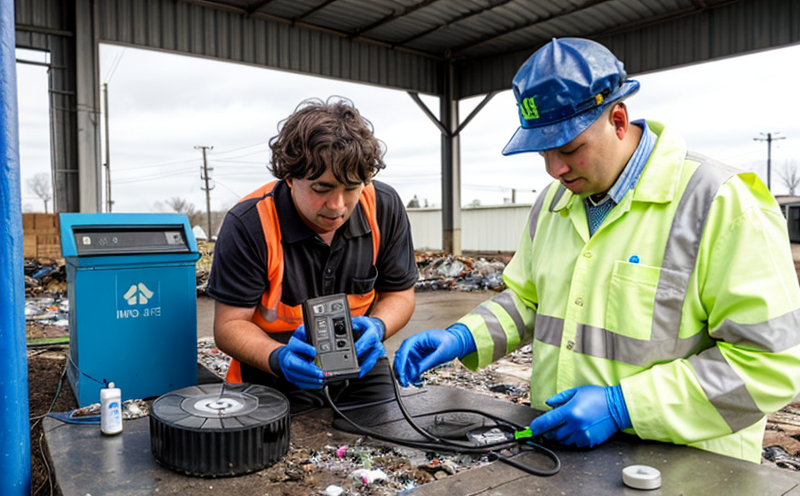JIS C8712 Portable Battery Waste Collection and Recovery
The JIS C8712 standard provides a comprehensive framework for portable battery waste collection and recovery in Japan. This service plays an essential role in ensuring the safe, efficient, and environmentally friendly management of used batteries. Portable batteries include various types such as lithium-ion (Li-ion) batteries, nickel-metal hydride (Ni-MH) batteries, and alkaline batteries. The standard aims to address environmental concerns by promoting the proper disposal methods that prevent hazardous materials from entering the environment.
The JIS C8712 specifies detailed procedures for collecting portable battery waste, including labeling requirements, safe handling practices, and storage conditions. It ensures that only properly identified and prepared waste is collected for recycling or incineration. This standard also provides guidelines on how to minimize risks associated with transportation and processing of the collected waste.
The service involves multiple steps from initial identification of portable batteries as waste through final disposal. Quality managers, compliance officers, and R&D engineers must ensure they meet the stringent requirements set forth by JIS C8712. For instance, batteries must be separated based on their type before collection to avoid cross-contamination during processing.
One critical aspect of this service is ensuring proper labeling. Labels should clearly indicate the battery type, manufacturer name, batch number, and date of disposal. This information helps recycling facilities process the batteries accurately according to their specific needs. Additionally, all collected waste must be stored in secure containers with appropriate signage indicating its contents.
The JIS C8712 also emphasizes the importance of educating stakeholders about responsible battery disposal practices. Training programs for employees handling portable battery waste are crucial components of this service. Compliance officers play a vital role in implementing these training sessions, which cover not only legal obligations but also best practices for minimizing environmental impact.
In summary, the JIS C8712 Portable Battery Waste Collection and Recovery service ensures that portable batteries are handled correctly throughout their lifecycle—from initial use through eventual disposal. By adhering to this standard, organizations can contribute positively towards sustainable development goals while avoiding potential penalties associated with non-compliance.
Benefits
Adhering to the JIS C8712 standards offers numerous advantages for businesses involved in managing portable battery waste. Firstly, it enhances operational efficiency by streamlining processes related to waste collection and recovery. Secondly, compliance with these regulations reduces legal risks associated with improper handling or disposal of hazardous materials. Thirdly, organizations that follow the guidelines can enhance their reputation as responsible corporate citizens.
Moreover, following JIS C8712 helps companies stay ahead of regulatory changes and industry trends regarding battery waste management. It ensures consistent quality in all aspects of portable battery waste collection and recovery operations across different locations within a single organization or between multiple organizations working together on such projects. Lastly, compliance fosters trust among customers who value environmentally friendly products and services.
Quality and Reliability Assurance
The JIS C8712 Portable Battery Waste Collection and Recovery service emphasizes the importance of quality control measures at every stage of the process. This includes rigorous inspections during collection, transportation, storage, and treatment phases to ensure only appropriate materials are processed further.
Quality managers overseeing these activities need to implement strict protocols for monitoring performance metrics such as contamination levels in collected waste streams or adherence rates to prescribed handling procedures. Regular audits conducted internally or by third-party assessors help maintain high standards continuously over time.
To guarantee reliability, ongoing staff training programs focusing on current best practices are essential components of this service. Compliance officers ensure that all personnel involved understand their roles fully and can perform tasks accurately under challenging conditions. Additionally, having robust documentation systems in place allows tracking every step taken during waste management activities, enabling quick identification if any issues arise later.
The emphasis here is on maintaining consistent quality levels across various geographical areas where this service operates. By doing so, companies demonstrating commitment to sustainable practices can build stronger relationships with stakeholders including regulators, customers, and community members alike.
Competitive Advantage and Market Impact
Meeting JIS C8712 requirements positions businesses as leaders in responsible waste management practices, enhancing brand reputation among environmentally conscious consumers.
Adopting this standard allows companies to demonstrate compliance with local regulations and industry expectations, reducing potential legal risks associated with non-compliance.
By implementing efficient waste collection and recovery systems based on JIS C8712 guidelines, organizations can optimize resource utilization rates within their supply chains, leading to cost savings over time.





